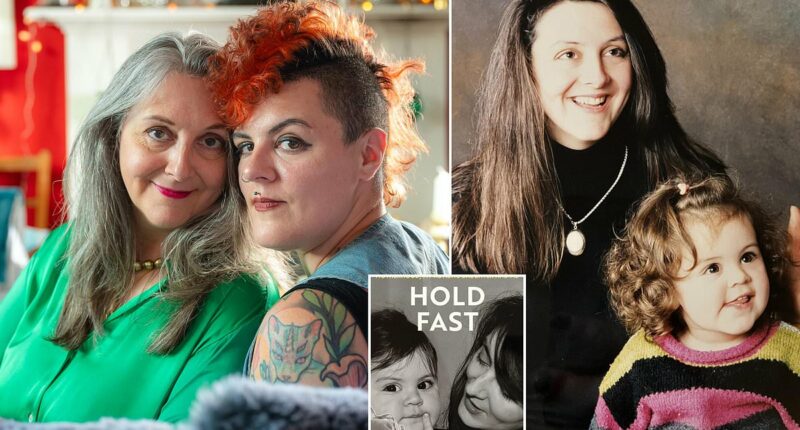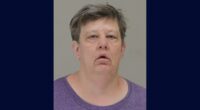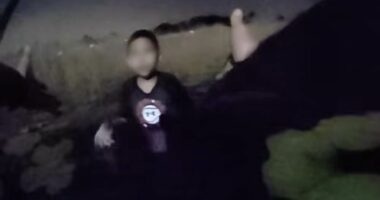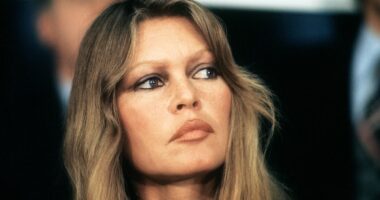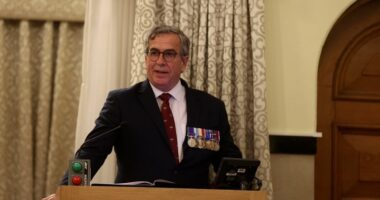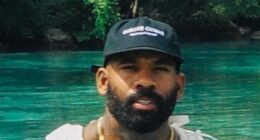Share this @internewscast.com
It was obvious to Catherine Simpson from the beginning that there was something different about her daughter, Nina.
Motherhood had always felt like Catherine’s destiny, but her dreams crashed headfirst into the reality of parenthood.
It seemed that the world was not Nina-shaped, and no matter how hard they both tried, they had to fight almost everything and everyone.
At the age of ten, Nina was finally diagnosed with autism. In Catherine’s heart-rending new book, she poignantly narrates the trials and tribulations of raising an autistic child, as well as the joy it eventually brought.
It became apparent why she didn’t think and behave like other children, yet her challenges were far from over with school bullies, indifferent doctors, and insensitive peers.
She and Catherine still felt as though it was them against a world that demanded Nina change as a child and Catherine change as a mother.
I got married to Marcello at thirty with the intention of having a baby as soon as possible, and I became pregnant with Nina straight away.
Once I overcame the morning sickness, I plunged into preparations: I collected pregnancy books filled with lists, charts, and diagrams, and eagerly attended health visitor appointments to be weighed, measured, examined, and evaluated.

Cathy Simpson with her daughter Nina when she was 18 months old
It was 1994 – pre-Google days – so I gathered leaflets at the doctor’s surgery and sought advice by word of mouth.
Despite disliking milk, I consumed a milky drink every day for the calcium needed for the baby’s bones and my teeth and avoided soft unpasteurized cheeses for fear of Listeriosis and miscarriage, and naturally, gave up alcohol.
I was reassured knowing my bread contained folic acid, which aids in preventing spina bifida. I developed a craving for apples and stocked up on ginger tea, mint tea, and raspberry leaf tea, although I can’t quite remember why, and I’m unsure I knew at the time.
It was a full-time job growing this baby.
I gave up my job – of course I did. It was motherhood all the way for me from now on.
I was going into this new experience wholeheartedly and was not someone who thought babies wouldn’t change anything.
I knew babies would change everything and I couldn’t wait.
I look back now and I realise that I had no idea how all encompassing ‘changing everything’ could possibly be.
As a first-time mother, I felt obliged to look sharp and do everything that was expected of me, DO IT PERFECTLY and do it now.
I’m not sure who I thought was watching and judging me, but I felt their hot breath right over my shoulder.
Nina smiled and delighted in cuddles, splashing in the bath, and being rocked in her seat, but she could also become inconsolably distressed for long periods, crying endlessly, and most challenging of all, she hardly seemed to sleep.
I had to make many tricky decisions each day, calculating how to minimise her distress. I constantly scanned the horizon for potential problems, making snap judgements. Where was it ‘safe’ to take her?
Where would she be content? Where would I be most likely to keep her happy? It was hard to know what might trigger her distress.
I was constantly on duty, hypervigilant, and getting increasingly exhausted and depleted by the day.
I decided to take her to a local gala day, but as the parade got into its stride, Nina began to scream and writhe in my arms and would not be calmed.
What had I been thinking, bringing her here to this busy, loud place on my own? I fled to a nearby café, but once inside the café, still she screamed. I took refuge in the café toilet where she immediately calmed down.
Faintly, I could still hear the brass bands and the cheers of the crowd as I stood in this tiny space feeling isolated and alone, except for this beautiful baby who was now peaceful, watching me with her big brown eyes, now we were alone in a toilet cubicle.
I looked at her and thought, is this the way it’s going to be? Is the world too frightening for you? Is it just you and me, babe? Just you and me?
Waterstones Bookstore on Edinburgh’s Princes Street became a bolthole on a Sunday afternoon.
I’d make my way through the shop, up the stairs and to an alcove at the back – to the Family section. Among the books about weaning and breastfeeding and how to entertain your toddler in Edinburgh, there was another book: Hidden Disabilities.
I would pore over the chapters on ADD, auditory attention problems, Asperger’s Syndrome (as it was then known), autism, dyslexia, depression, going through the alphabet of conditions, searching for clues – trying to understand my baby, trying to decode what was going on, because I knew something was.
Even though Nina was still a baby and no one else was with me on this, I knew.
I’d face the shelves, my heart beating so hard I could feel the pulse in my scalp, and read a bit more each week, too frightened to buy the book and tempt fate.
I would become so firmly rooted to the spot, my heart in my mouth, my hands moulded to the book, that it became difficult to turn and face the world again.
I sensed the road diverging and I wanted to take the easier route – the easier one for me and the easier one for my child. I wanted to head down the road most travelled.
I wanted to face the same challenges as the other mothers, and for my child to face the same challenges as the other children, but I felt a stone-cold fear in the pit of my stomach that Nina and I were already lost, stumbling alone down the road less travelled, and nobody seemed to have noticed but me.
I would wake up each morning thinking, maybe today. Maybe today I will be a good mother with a contented baby. But it never was today.
On Nina’s first birthday, she sat in her highchair at her party chewing on her favourite plastic dwarf – Doc, the self-appointed leader of the seven dwarves, who she would not relinquish and who therefore had to be guarded like a crown jewel.

Author Cathy Simpson with her daughter Nina in their home
I had begun to think of Nina as a ticking time bomb – Danger UXB – and we wondered if we would get through this family party without an explosion.
There were many potential detonators: the sight of an unwrapped present – was it the sound of ripping paper, the unknown contents of the package, the unpredictable nature of a surprise present, or something else?
We didn’t know. Or it could be a balloon that might pop, a strange face looming too close, or a voice too loud. I look back now and wonder who we were having this party for. Nina didn’t want a party: all she wanted was us and Doc. Again, I was doing it because it was, apparently, the thing to do.
I was nothing if not persistent with the dire mother and baby groups, including one where mothers sat on the floor in a circle holding their toddlers on their knees to sing songs. ‘Do the actions!’ We were ordered. ‘Join in!’ Uninvited, Nina decided to sit in the middle of the circle, then another child crawled to join her, then another, until it became clear that all hell was breaking loose, and before long all the babies would be in the middle. No! I was told. This is Not Allowed! No babies in the circle! Every mum must toe the line and take their child onto their knee!
It didn’t do in this environment to be different in even the most innocuous of ways. Everything was about conformity, otherwise there would be anarchy at Tumble Teds.
We left and did not go back. I felt increasingly disconnected from the outside world. Who even was I? Not the competent mother I had hoped to be, that was for sure.
We took Nina to the hospital to see ‘the leading expert on autism in Scotland’ when she was two and a half. She trotted round his office taking no notice of us, or him, but examining closely everything on his shelves.
I tried to explain the nature of the challenges we were facing but he laughed – literally laughed in my face – as he said, ‘That child does not have autism.’
In 1997, autism was still thought of as a male condition.
‘You are giving her the wrong kind of attention,’ he said. ‘That is what is causing the problem. You must ignore her if she has a tantrum.
Just let her cry. You are creating the bad behaviour by rewarding it with attention.’
In Primary 3 Nina was very unhappy in school and was again sent for assessment by a psychologist who told me Nina had ‘no hard wiring problem such as autism’ and it was up to me to get the parenting right.
It was all my fault again, apparently – except now I was accused of giving her too much attention, rather than the wrong sort – and so the psychologists inducted me into the cult of the star chart and the naughty step.
The star chart and the naughty step did not make a blind bit of difference of course. They were just something else for me to administer.
When Nina was ten, we met with the school psychologist and once again I was sent on a parenting course where this time the strategy was ‘time outs’ which was the naughty step in a different guise. I was told categorically: ‘If you treat your child differently, you will have a different child.’
I was fast becoming the best qualified mother in Midlothian and yet our problems continued.
After several months on a waiting list we were also referred to the Child and Adolescent Mental Health Service (CAMHS) where after meeting ten-year-old Nina several times Dr C recommended Nina for an assessment that confirmed she had autism.
When she told us, I could not speak and instead immediately burst into tears. Ten years of not really understanding her, blaming her for being her, showing frustration with her, being told all our troubles were my fault, feeling like such a failure, and now here was the explanation given in one simple sentence. Nina was autistic.
‘You’re not surprised, are you?’ asked Dr C, clearly surprised herself at my reaction.
That was the moment I understood the previously puzzling phrase ‘shocked but not surprised’. Despite all the years of being told otherwise, I had suspected this was the case but was still shocked and deeply shaken that the official landscape of our lives had completely changed in the space of one sentence.
I was frightened. What did Nina’s future hold? Would she ever be able to find her niche in this world?
Now, at last, we had this information. Nina was the same girl she had always been – the diagnosis made no difference to that – but her whole context was different. We were now seeing her from an entirely new perspective.
Previously, we had been trying to care for a Rolls Royce using the handbook of a Nissan Micra – now, at last, we could hopefully access the right information.
I did much research and I began to see autism everywhere – the child who was described as ‘difficult’, ‘awkward’, ‘in a world of her own’, ‘one of her own’, ‘walking to the beat of their own drum’, ‘a bit weird’; children who were shunned or ridiculed by other children; children who other mothers pursed their lips at with a ‘that spoilt child needs a good hiding’ look; children who lost themselves in books and computer games. I began to feel drawn to them and protective of them.
After Nina’s diagnosis, the more I read, the more obvious Nina’s autism became: the hypersensitivity to noise, smell, heat and touch.
Being able to hear fluorescent lights, fans and fridges from the next room, and folding her ears over if a baby was crying or a lawnmower roaring anywhere nearby.
Being able to smell the honey in a flower and the fruit in the wine but hating being at the service station because it reeked of petrol even inside the car.
Being sensitive to the feel of zippers and waistbands, hating having her hair brushed and cut, hating being tapped on the shoulder and other unexpected touches, her discomfort in crowds and playing team sports.

In her heart-rending new book Catherine poignantly details the trials and tribulations of bringing up an autistic child – and the joy it ultimately brought
I remembered the hyperlexia – the ability to decode letters very early. Her intense interests – ‘special interests’ – in dinosaurs, planets, times tables, Pokémon and so much more; her deep concentration that took her away from this world and into another; her agitation around change and transitions; her difficulty fitting in at school and making friends because other children could sense a difference.
The tantrums she had had over the years, which I now understood to be autistic meltdowns – expressions of distress when the world had overwhelmed and overloaded her hypersensitive brain and could perhaps be better understood as a form of panic attack.
Looking back, it seemed Nina had been presenting as a classic case of autism for years.
Unfortunately, after moving onto high school, the diagnosis did not protect Nina from bullies who tormented her including kicking her down the stairs.
A day or two after her attacker was not suspended, Nina phoned from school, having been bullied yet again, and said, ‘Please, just buy me some books and let me stay at home. Please.’ And there it was, the straw that broke the camel’s back.
A moment of release, of letting go of the belief that I had somehow to make Nina fit in in this way. This could not go on. ‘Yes,’ I said, ‘we’ll find another way.’ It was such a relief to finally decide that enough was enough and somehow or other we would remove her from a place I don’t think she had ever felt safe.
We moved her to the Edinburgh Steiner School.
There was an ethos of kindness and acceptance at the school, and less emphasis on conforming that allowed Nina to dare to tell her classmates about her autism. She called it ‘coming out’ because she was making herself vulnerable and disclosing a fundamental part of her identity.
She reported back: ‘No one called me a “retard”!’, a word she found highly offensive and that had been thrown around, including at her personally, at her previous school. Her new classmates were interested in her autism and then they accepted it. In fact, her friend Anna said, ‘Oh, I know, you’re autistic. I noticed that on the first day.
Nina graduated from Edinburgh University in a ceremony at the McEwan Hall in 2017.
At the end of the graduation ceremony, the dignitary officiating made a speech praising the hard work of the graduates but then added that none of their success would have been possible without those of us in the audience who had supported them on the way.
He suggested they turn and give us a wave. From our bench high at the back, I watched Nina at the front jump up and turn, bouncing on her toes as she lifted both arms, her graduation gown flowing as she gave a great full-length wave, waving and waving at us, not drowning now but definitely waving, a picture of happiness across this wideopen space.
The cheers from students and parents alike echoed under the dome. The whole hall was cheering and waving.
Every family only had eyes for their own graduating child, perhaps remembering their own stories, reflecting on the days, or the weeks, when they too could hardly believe they would ever reach this moment here today, this moment of celebration, this moment of pure joy.
* Hold Fast: Motherhood, My Autistic Daughter and Me, by Catherine Simpson. Published by Saraband on 14th August, £12.99.
